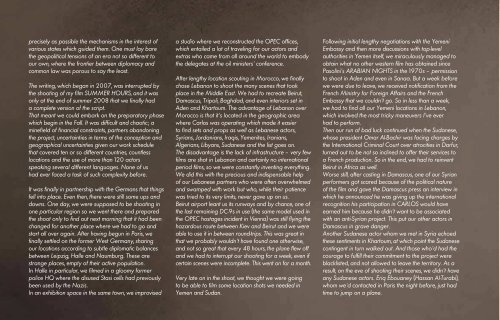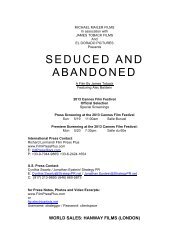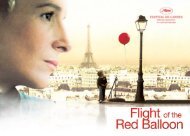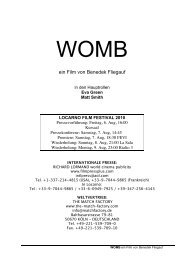download notes (eng) - film press plus - richard lormand
download notes (eng) - film press plus - richard lormand
download notes (eng) - film press plus - richard lormand
You also want an ePaper? Increase the reach of your titles
YUMPU automatically turns print PDFs into web optimized ePapers that Google loves.
precisely as possible the mechanisms in the interest of<br />
various states which guided them. One must lay bare<br />
the geopolitical tensions of an era not so different to<br />
our own, where the frontier between diplomacy and<br />
common law was porous to say the least.<br />
The writing, which began in 2007, was interrupted by<br />
the shooting of my <strong>film</strong> SUMMER HOURS, and it was<br />
only at the end of summer 2008 that we finally had<br />
a complete version of the script.<br />
That meant we could embark on the preparatory phase<br />
which begin in the Fall. It was difficult and chaotic; a<br />
minefield of financial constraints, partners abandoning<br />
the project, uncertainties in terms of the conception and<br />
geographical uncertainties given our work schedule<br />
that covered ten or so different countries, countless<br />
locations and the use of more than 120 actors<br />
speaking several different languages. None of us<br />
had ever faced a task of such complexity before.<br />
It was finally in partnership with the Germans that things<br />
fell into place. Even then, there were still some ups and<br />
downs. One day, we were supposed to be shooting in<br />
one particular region so we went there and prepared<br />
the shoot only to find out next morning that it had been<br />
changed for another place where we had to go and<br />
start all over again. After having begun in Paris, we<br />
finally settled on the former West Germany, sharing<br />
our locations according to subtle diplomatic balances<br />
between Leipzig, Halle and Naumburg. These are<br />
strange places, empty of their active population.<br />
In Halle in particular, we <strong>film</strong>ed in a gloomy former<br />
police HQ where the disused Stasi cells had previously<br />
been used by the Nazis.<br />
In an exhibition space in the same town, we improvised<br />
a studio where we reconstructed the OPEC offices,<br />
which entailed a lot of traveling for our actors and<br />
extras who came from all around the world to embody<br />
the delegates at the oil ministers’ conference.<br />
After l<strong>eng</strong>thy location scouting in Morocco, we finally<br />
chose Lebanon to shoot the many scenes that took<br />
place in the Middle East. We had to recreate Beirut,<br />
Damascus, Tripoli, Baghdad, and even interiors set in<br />
Aden and Khartoum. The advantage of Lebanon over<br />
Morocco is that it’s located in the geographic area<br />
where Carlos was operating which made it easier<br />
to find sets and props as well as Lebanese actors,<br />
Syrians, Jordanians, Iraqis, Yemenites, Iranians,<br />
Algerians, Libyans, Sudanese and the list goes on.<br />
The disadvantage is the lack of infrastructure – very few<br />
<strong>film</strong>s are shot in Lebanon and certainly no international<br />
period <strong>film</strong>s, so we were constantly inventing everything.<br />
We did this with the precious and indispensable help<br />
of our Lebanese partners who were often overwhelmed<br />
and swamped with work but who, while their patience<br />
was tried to its very limits, never gave up on us.<br />
Beirut airport leant us its runways and by chance, one of<br />
the last remaining DC-9s in use (the same model used in<br />
the OPEC hostages incident in Vienna) was still flying the<br />
hazardous route between Kiev and Beirut and we were<br />
able to use it in between round-trips. This was great in<br />
that we probably wouldn’t have found one otherwise,<br />
and not so great that every 48 hours, the plane flew off<br />
and we had to interrupt our shooting for a week, even if<br />
certain scenes were incomplete. This went on for a month.<br />
Very late on in the shoot, we thought we were going<br />
to be able to <strong>film</strong> some location shots we needed in<br />
Yemen and Sudan.<br />
Following initial l<strong>eng</strong>thy negotiations with the Yemeni<br />
Embassy and then more discussions with top-level<br />
authorities in Yemen itself, we miraculously managed to<br />
obtain what no other western <strong>film</strong> has obtained since<br />
Pasolini’s ARABIAN NIGHTS in the 1970s – permission<br />
to shoot in Aden and even in Sanaa. But a week before<br />
we were due to leave, we received notification from the<br />
French Ministry for Foreign Affairs and the French<br />
Embassy that we couldn’t go. So in less than a week,<br />
we had to find all our Yemeni locations in Lebanon,<br />
which involved the most tricky maneuvers I’ve ever<br />
had to perform.<br />
Then our run of bad luck continued when the Sudanese,<br />
whose president Omar Al-Bachir was facing charges by<br />
the International Criminal Court over atrocities in Darfur,<br />
turned out to be not so inclined to offer their services to<br />
a French production. So in the end, we had to reinvent<br />
Beirut in Africa as well.<br />
Worse still, after casting in Damascus, one of our Syrian<br />
performers got scared because of the political nature<br />
of the <strong>film</strong> and gave the Damascus <strong>press</strong> an interview in<br />
which he announced he was giving up the international<br />
recognition his participation in CARLOS would have<br />
earned him because he didn’t want to be associated<br />
with an anti-Syrian project. This put our other actors in<br />
Damascus in grave danger.<br />
Another Sudanese actor whom we met in Syria echoed<br />
these sentiments in Khartoum, at which point the Sudanese<br />
contingent in turn walked out. And those who’d had the<br />
courage to fulfill their commitment to the project were<br />
blacklisted, and not allowed to leave the territory. As a<br />
result, on the eve of shooting their scenes, we didn’t have<br />
any Sudanese actors. Eriq Ebouaney (Hassan Al-Turabi),<br />
whom we’d contacted in Paris the night before, just had<br />
time to jump on a plane.<br />
As for the other roles, we had to pick and choose from<br />
among our extras from the Sudanese community in Lebanon,<br />
many of whom were political exiles. But it was finding the<br />
actor for the role of the gynecologist which gave us the<br />
hardest time. On the morning of the shoot, we still didn’t<br />
have anyone and it was our Lebanese costume designer<br />
who suggested her dentist. He was immediately recruited<br />
and quite by chance, he turned out to be excellent.<br />
After that, we were able to shoot a few landscapes<br />
without actors in Khartoum and Aden in the fall of 2009,<br />
and they make a fine backdrop.<br />
The shoot began at the end of January in London and ended<br />
in the op<strong>press</strong>ive heat of a Lebanese summer on the eve of<br />
the Bastille Day weekend. In between, we’d had to stop for<br />
three weeks to let Edgar Ramírez put on the necessary extra<br />
weight he needed for his final appearance as Carlos.<br />
We were also shooting during elections in Lebanon,<br />
but this did not result in the chaos we had feared.<br />
Ninety-two days: that is both a great deal and not<br />
very much at all. Much longer than a regular shoot, but<br />
unfortunately we weren’t just making one <strong>film</strong> but three,<br />
with thirty days for each. Given the traveling time, the action<br />
scenes and the complexities involved in such historical<br />
reconstructions, it wasn’t very much time at all.<br />
But all these difficulties are intrinsic to a unique project with<br />
no real precedents to go on, and which we had to invent<br />
from day to day, at every stage and in every area.<br />
We only succeeded because everybody, on every level,<br />
including those with the very smallest parts to play, performed<br />
miracles on a daily basis, making the impossible possible.<br />
Olivier Assayas<br />
Edgar Ramírez and Martha Higareda










